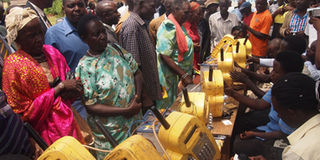Why Uganda needs elder persons grant

Elders in Kyankwanzi District receive money under government’s Social Assistance Grant for Empowerment programme. A report shows that more Ugandans have become poorer in the last five years. File photo
What you need to know:
Since 2010, the elderly in 15 districts of Uganda have been receiving Shs25,000 every month as part of a programme to empower them. However, there are plans to phase it out
She walks out of her ramshackled house limping. Her left side is paralysed as a result of the injury she sustained after falling down.
She does not know her age but on observation, Ephrance Bukirwa’s body appears old and frail, and her hair is now grey with age. She cannot do any job for herself apart from making fire and keeping it burning while preparing food.
Bukirwa is being taken care of by her only surviving daughter, Rebecca Nalunkuuma, who stays about 300 metres away from her home and she cannot tell where the grandchildren are.
“I cannot dig nor collect food from the garden. I could even take months without sugar and even meat,” says Bukirwa, adding that her house is only good during the sunny season; “But when it rains, it is leaking and it used to be too cold for me until they bought me a blanket from my money.”
Bukirwa recalls that before the coming of senior citizens’ grant, she faced difficulty to access tablets during illnesses and shortage of food whenever a dry spell hit their area
The resident of Butemba Cell in Kyankwanzi District is one of the thousands of elder persons, who access the monthly grant of Shs25,000. Kyankwanzi is part of the cattle corridor that experiences dry spells leading to shortage of water and food.
However, due to her inability to walk, Bukirwa’s 67-year-older daughter Nalukuma, who is also a beneficiary of the same programme, collects the money for her.
“When she collects the money, I can now have sugar, meat, beans and porridge. I am also able to get tablets in time in case of any sickness,” smiles Bukirwa adding; “I have asked my daughter to start saving some of the money because I am looking forward to sleeping in a well roofed house.”
The programme
The Senior Citizens Grant, one of the core components of the Social Assistance Grant for Empowerment, started in 2010 with financing by government and development partners. This was aimed at responding to the legal obligation of the state to provide welfare and maintenance for the aged.
Currently, the programme benefits 110,135 persons aged 65 and above in 15 districts and it is aimed at enhancing access to basic needs such as food security, better nutrition, health care and improving housing among others.
Janet Nakyanzi, 75, of Bukwili Cell, says apart from buying food, she saved the money to buy household utensils like basins and saucepans.
“I saved part of the money and I have since bought a pig,” says Nakyanzi who takes care of three grandchildren and her blind sister.
She narrates: “We no longer find problems to buy soap, sugar and I saved money which I used to buy bedsheets.”
Joseph Mugisha, the Social Protection and Advocacy Advisor at Help Age International says there is need to ensure that older persons live respectfully.
“We have now embarked on the campaign that would see political parties include social protection issues into their campaign programmes while canvassing for votes for the 2016 elections,” he says.

Mugisha says they want government to commit resources as a priority towards social protection to help older persons to live decent livelihoods because they are the bridge between the past and the future.
He explains that over Shs30b was expected the national rollout if the programme was to benefit 100 persons per sub-county but government has committed Shs9 billion in the current budget.
“This is not enough and yet the pilot arrangement had ended. We want government to find means of getting the money and prioritise the senior citizens grant with a view of enhancing the livelihoods of elderly,” adds Mugisha.
How they have been benefitting
Reports from the Ministry of Gender indicate that the senior citizens grant is increasing productive investment where 32 per cent of the beneficiaries use the money to buy small livestock or petty trading while 27 per cent of the beneficiaries invest their money in hiring additional labour for digging in their gardens.
“…Sixteen per cent of the beneficiaries report saving of their previous month’s payment. Savings were mainly to cover emergencies (20 per cent), to support productive investments (17 per cent), cultivation (15 per cent and meeting the education needs of children and or grandchildren taking 14 percent,” reads the report on expanding social protection programme for senior citizens grant.
According to the report, majority of the senior citizens grant beneficiaries spend the large part of their transfers on food leading to increased frequency, quantity and quality of meals eaten by beneficiary households.
“Senior Citizens Grant beneficiaries especially women consistently report improved participation in community affairs, sense of self-esteem and empowerment. Older people report feeling less discriminated against in their communities and more valued by their families on account of their ability to make social contributions to community- based social support mechanisms which are based on reciprocity like funerals and weddings,” reads the report.




